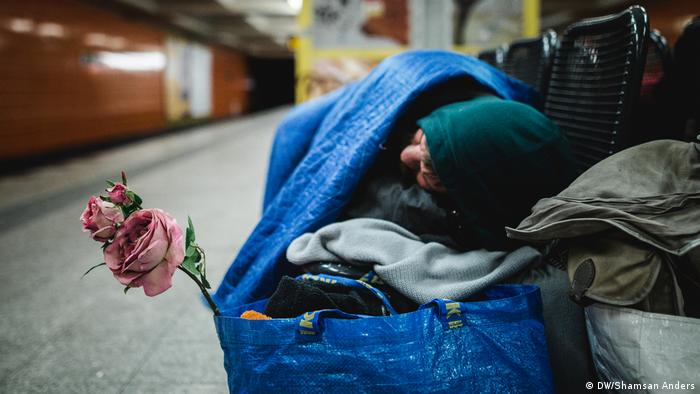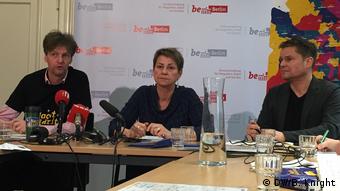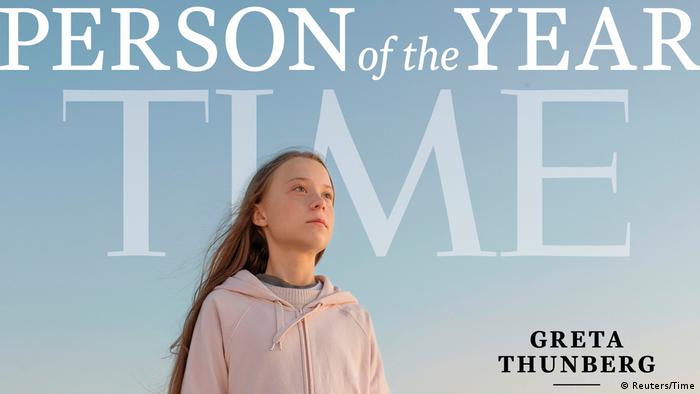Berlin carries out first homeless census
Berlin's government wants to count the city's homeless population. Apart from helping to combat homelessness, the "Night of Solidarity" is to show that the German capital considers "homeless people part of our city."

Berlin is to become only the third city in the world, after New York and Paris, to attempt an accurate count of its homeless population.
A three-hour count on Wednesday night is part of a new city initiative to improve homeless policy in the German capital, a move charities and social workers have requested for years. Homelessness has been on the rise in Germany, according to at least one study published last year.
The "Night of Solidarity," the same title used in Paris, will see 3,700 volunteers, divided into teams of three to five, issued with laminated maps and sent off on predetermined routes through 617 specially-drawn up zones of the city.
The volunteers will count all the people they find sleeping rough, and carry out brief questionnaires about their age, gender, nationality, and how long they have been on the streets.
Details needed to provide help to homeless
The Night of Solidarity began with a choir named Different Voices of Berlin, which launched into a rousing song reminding the gathered reporters and volunteers, "If you look away, you don't see anything."
Mayor Michael Müller explained that the purpose of the count was to develop a less abstract homeless policy.
"Of course we discuss with all the important institutions, or in the government, but I have to admit I often don't have an idea that it's about people who can't get access to the help that we offer.
"It's certainly thousands of people, and so far too many," he added. "We are dealing with the question of who lives on the streets. We want these numbers so that we can provide better and more individual help."
No time to hand out soup
The volunteer teams will each include a professional or a volunteer with some experience with homeless people, or some who have been homeless themselves. Ahead of the count, the volunteers were instructed in a code of conduct that underlines the importance of respect: They are not allowed to look inside any tents or huts they find, shine torches at people, take photos, or wake anyone up.
At the same, the volunteers' tasks are to be strictly limited: "We only have three hours time, and there will be no time for long counseling or giving out soup," said project director Klaus-Peter Licht at a press event a week before the count. For privacy reasons, reporters are also forbidden from watching the count.
Read more: From sleeping bags to their own homes
Fuzzy stats and guesses
The project was instigated by Berlin's Ministry of Integration, Labor and Social Affairs, on a model piloted in Paris, which is carrying out its third count at the end of January.
Accurate statistics on homelessness are hard to ascertain. Like many cities, Berlin keeps figures on the number of people living in shelters, currently around 36,000, but it has no way of knowing how many people are actually sleeping rough.
"We don't have any numbers, we just have estimates," said Minister Elke Breitenbach. "And depending on where you look, say if you look around the Zoo Station, you'd get the feeling that we have an endless number of homeless people in this city."
Just as important, the project is also designed to get a more accurate demographic portrait of the homeless population, which is why the questionnaire is in 14 languages. According to official statistics, of the 36,000 people in shelters, 16% are women and more than half are from a non-EU country.

Berlin has a pilot project to help homeless people by giving them a place to live
"Homelessness is much more international nowadays, it's more female, and we are seeing more homeless people with a severe disability, and more older people," said Breitenbach. "Because of that, we said we have to set up homelessness support in a way that it is adapted to the needs of homeless people so that it actually reaches people and is comprehensive."
Indeed, that was one of the results of the first Paris survey, which found that there were more homeless women than it had previously imagined, and quickly set up more spaces in shelters for homeless women. Last year, the Paris survey also found a 21% increase in the number of homeless, with some 600 people sleeping rough.
Where do homeless people live?
In addition, there are conflicting theories about where exactly in Berlin homeless people live: some people, the minister said, assume that they are more likely to stay in the city centers, where they have better chances of collecting bottles and begging, though others believe that, like many marginalized groups, they are increasingly being pushed to the outskirts.
"But we just don't know," said Breitenbach, before underlining that she hoped the count would only be the first of many, and inspire similar programs in other German and European cities.
The European dimension of the count cannot be underestimated: the fact that EU citizens are free to seek work anywhere in the bloc has, despite its economic advantages, led to more homelessness among non-Germans in Germany, as they have no right to claim social security.
Berlin, Breitenbach said, is trying to focus on helping the city's disadvantaged.
"The main thing," the minister concluded, "is that we want to show solidarity, and show that we consider homeless people part of our city."
Berlin is already trying out pioneering strategies for combatting homelessness. Last year, the city started a three-year pilot project called "Housing First," which gives homeless people an apartment, with a rental contract, on an unconditional basis: that is, there is no obligation to take part in any type of therapy or back-to-work program. The project is mainly, but not only, aimed at long-term homeless people with psychological problems, or those struggling with addiction.






















